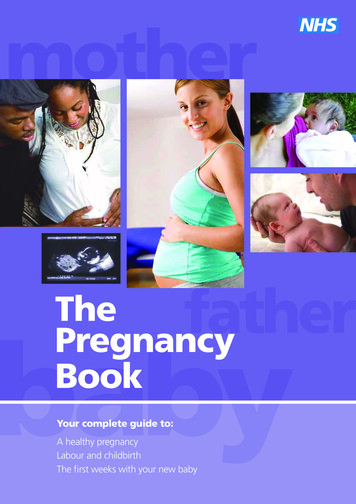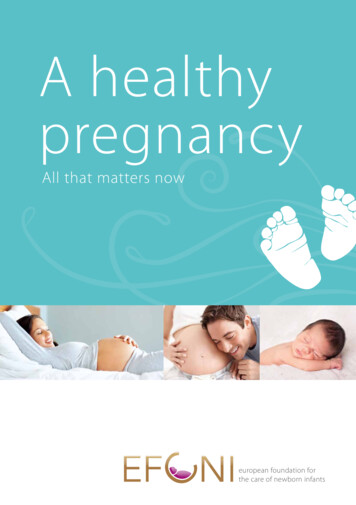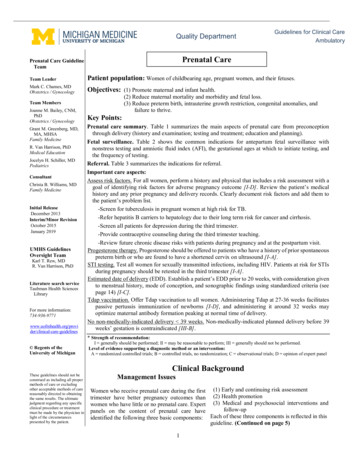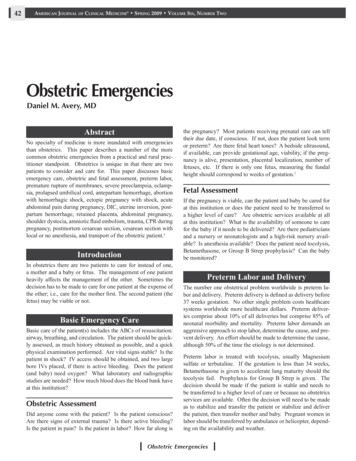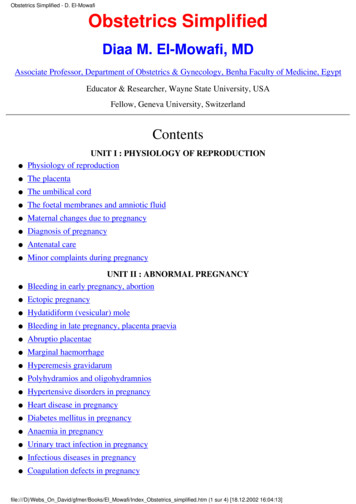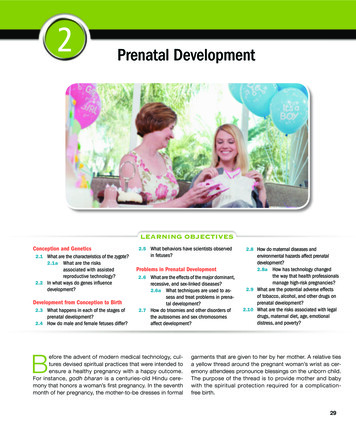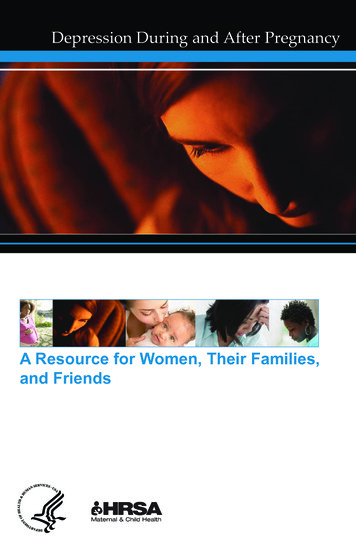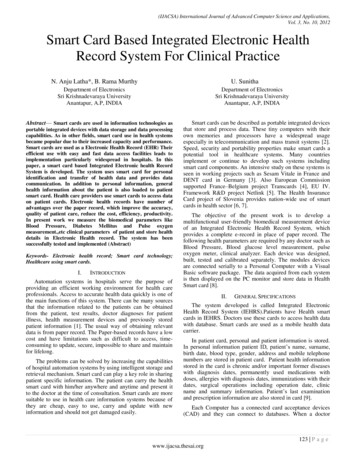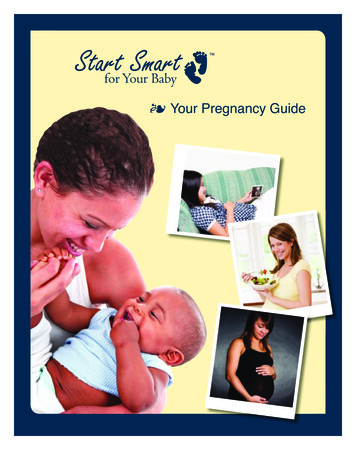
Transcription
Your Pregnancy Guide
Start Smart Pregnancy BookCongratulations! You are going to have ababy! Having a baby is a special privilege.It is the beginning of the strongest of allbonds—the bond between a parent and child.Both first-time moms and women whoalready have children will want to read thisbooklet. Learn how you can give your baby ahealthy start in life by taking care of yourselfwhile you are pregnant. See how your baby isgrowing each month. Find out tried and truetips to manage morning sickness from othermoms-to-be like you. Read about needed testsand times you’ll want to visit the doctor.Some people read this booklet cover to cover.Others turn to the section they want to knowmore about. Glance at the What’sInside section to guide you to each topic.Also, be sure to share this booklet withyour friends and family as you enter anexciting new journey—the birth of your baby.For more information on prenatal care,visit us at www.startsmartforyourbaby.com 4 Start Smart Pregnancy Book
What’s Inside:Your First OB Visit .2Your Case ManagerCan Help You Stay Healthy .3Prenatal Testing .4Body Basics—Your Reproductive System .8Taking Care of Your Emotions .40A Peek Inside Your Body .9Getting Ready for the Big Day .41Watching Your Baby GrowEach Month .10Childbirth and Parenting Classes .41How Your Body Changes .12Choosing Your Baby’s Doctor .43Keeping Your Growing Baby Safe .14Getting Ready for the Hospital .43Quit Smoking—Good for Your Baby!.15Protect Your Baby from Other Dangers .15The Big Day Is Here!—Labor and Delivery .46Take Steps to Lower Stress .173 Stages of Childbirth .49Staying Physically Active .18Induced Labor.49Eating Well for Baby and You .19Managing Pain During Delivery .50Taking Vitamins .23Having a C-Section .52Get the Facts on Folate .24Your Recovery—Bouncing Back After Childbirth.53Feeling Good While You are Pregnant .26When Things Go Wrong .30Preterm Labor—What You Need to Know .31If You Have Bleedingin Early Pregnancy .33When a Miscarriage Happens.34Taking Care of Older Children .43When the Baby Blues Last—Postpartum Depression .55Breast Milk or Formula? .56Baby’s Doctor Visits.60Will You Have YourBaby Boy Circumcised? .60Keep Your Baby Safe .60Bladder and Kidney Infections—Your Questions Answered .35Going Home From the Hospital. 62Diabetes During Pregnancy .37Seeing Your OB AfterYou Give Birth .63PIH—High Blood PressureWhen You Are Pregnant .38Think About Baby Names.67What’s Inside 1
Your First OB Visit“I made adoctor’s appointmentthe day after I did a homepregnancy test. At my first visit,my doctor did an ultrasound tomake sure my baby was healthy.I found out my baby’s due date. Ialso started taking specialvitaminspright away to help mybaby grow well.”See your doctor as soon as you thithinkk youare pregnant. Studies show that gettingprenatal care early can help you have ahealthier baby. And you know you want togive your child the very best start at life!Your doctor will get blood tests to: Check your blood type and blood counts.Find out whether your body is protectedfrom some diseases like German measles.Check for any STDs and hepatitis.Check your urine for protein, sugar,or iinfection.Bld tests are very importantiBloodto helpyour doctor learn about your health. Everypregnant patient should get these tests.At your first prenatal visit:Your doctor will take your complete healthhistory. Talk to your family and the baby’sdad before your visit. Ask them about anyhealth problems that run in the family. Then,share what you learn with your doctor. Tellyour doctor about any health problems youmay have. List any medicines you take. Your doctor will do an exam.Your doctor will do a pelvic exam.You may get to hear the baby’s heartbeat.Your doctor may do an ultrasound. 2 Your First OB VisitYour doctor and your health teamare here to help!Make sure you ask all of the questions youwould like to. Your doctor wants to know whatis on your mind. Remember, no question is silly.
Your Case Manager CanHelp You Stay HealthyQ:A: How many times will I need to visitthe doctor while I am pregnant?In most cases, your prenatalvisits will be:Every 4 weeks during the first29 weeks you are pregnantEvery 2 to 3 weeks after youare 30 weeks pregnantAfter 36 weeks, every 1 to 2weeks until you go into labor“My case manager is great.She helped get me into a group formoms who are having twins. It isnice to have someone take suchan interest in me and my babies.Last month she found an agencythat can help with my heating billswhile I’m on bed rest. HavingMs. Barnes as my manager is likehaving someonemeone in my cornerwho reallyy cares.”You should go to all of your prenatalvisits, even if you are feeling well. Yourhealth and the health of your babydepend on it.Tanya’s Tip:Keep everything in one place!“Buy a notebook with pocketsat the dollar store and decorate itup with all kinds of stickers. Writedown any questions you have foryour doctor or nurse betweenvisits. Keep your appointmentcards and prescriptions in a safeplace until yyou need them.”Most often a case manager is a nurse or asocial worker who is assigned to certainmembers of a health plan. This person doesn’tprescribe medicine or give you hands-on healthcare. He or she can help you understandwhat is going on with your body duringyour pregnancy, offer emotional support,help you find resources, and work to keepyour medical team informed about anyhealth problems.Your Case Manager Can Help You Stay Healthy 3
Prenatal TestingYour case manager: Can teach and prepare you to makehealthcare decisions that are best for youand your babyWorks with other members of yoursupport team and helps everyonework toward the same goalCan answer your questions about medicines,treatment, or just general questions aboutbeing pregnantHelps find resources if you need assistancewith personal or daily care needsCan offer you extra attention to help youhave a healthy baby“I’m not really big intogetting lab work done—guessyou’d say I am kind of a babywhen it comes to getting myblood drawn. But then the nurseexplained that these tests can tellme if my baby is doing okay.Some tests also show if I am healthy.So, I make sure I get all the neededtests. Being pregnant is a very bigresponsibility and now I need tothink of someone other than myself.Truly, more than anything—I wantmy baby to have agood start at life.”If you would like to speak to a case manager,you can reach the case management departmentthrough member services at your health plan.You will need to get speciall types off tests atdifferent times during your pregnancy. This iscalled prenatal testing. Some tests look at yourhealth—others look at your baby’s health. Ifyou get too far along, you may not be able toget the tests you need. Make sure to go to allof your visits so you don’t miss any tests.At Each VisitYour doctor will ask for a urine sampleat each visit. You will pee into a cup soyour doctor can check your urine. Thissample will show your sugar and proteinlevels and tells if you have an infection. 4 Prenatal Testing
Testing for Possible Birth DefectsWhen you go to the doctor early in yourpregnancy, you can get the best tests availablecalled first trimester screening tests. A bloodtest is done where a small amount of blood istaken from your arm with a needle. The bloodis collected in tubes and sent to a lab. Thescreening also includes an ultrasoundmeasurement of the skin thickness at the backof the baby’s neck. These tests can be done asearly as your 3rd month. The tests are a wayto check for the risk of birth defects beforethe baby is born. Ask your doctor about firsttrimester screening.If you miss this early test, there is anothertest called the quad test. It is done betweenyour 16th and 20th weeks. A small sampleof your blood is drawn for the test. This testmeasures 4 proteins and hormones. Thetests can often show if there is a chance thebaby will have Down’s Syndrome, problemswith the spine, kidneys, and intestines.The first trimester or quad test cannot tell forcertain that there is a birth defect. The testscan give you an idea of the chances of havingcertain birth defects. Your risk is based on somefactors that include: your age, your weight, yourrace, and your health among other things.The tests are not 100% correct all the time.the tests don’t show up as normal because of anincorrect due date (the tests use the age of yourbaby as a measurement.) If your test comes upas abnormal, your doctor may repeat the test ordo other follow-up tests such as an ultrasound.Talk to your doctor about any concerns you havewith your test results. About AmniocentesisIf the test for Down’s syndrome describedabove comes out “abnormal,” your doctor willmost likely suggest a second test. This test iscalled amniocentesis, or amnio for short. Forthis test, the doctor will insert a long, verythin needle through your belly. Most womenreport it doesn’t hurt. Some women say theyfeel a quick tug or pinch. Next, the doctorwill remove a small amount of water from thesac that surrounds the baby. The fluid is thentested to check the baby’s chromosomes.If your test comes back “normal” the chance ofa birth defect is quite low. Still, the baby couldhave a birth defect that is not picked up by theblood test.Why else is an amnio done?If your test results come back “abnormal” itdoes not always mean that a baby has a birthdefect. In fact, most women who haveabnormal results have healthy babies. At timesSometimes this test can find out late in yourpregnancy if the baby’s lungs are mature.Sometimes doctors use this test to look forrare diseases or infections in the baby.The test can tell if you are having a boy or a girl.Prenatal Testing 5
About UltrasoundThis test uses sound waves to look at the babyin your belly. It is common to have this testat about 18 to 20 weeks—or just about themiddle of your pregnancy. The person doingthe test will place a clear jelly on your belly.Then he or she will gently press an instrumentover your tummy. The test does not hurt.Later in your pregnancy, the test can: Show your baby’s growth and positionCheck the fluid around the babyMake sure the baby is moving and healthySome possible health problems in the babymay be too small to see. An ultrasoundcan not diagnose Down’s syndrome. About Vaginal UltrasoundThe ultrasound will look closely ateverything that is going on in your womb.The ultrasound will measure: The placenta. This is the tissue that connectsyou and your unborn baby in the womb. Itbrings food to the baby and takes waste out.The amount of fluid in the sacThe baby’s sizeThe ultrasound will show: If you are carrying one or more babiesHow your baby’s heart, stomach, kidneys,and spinal cord look 6 Prenatal TestingThe technician places an instrument with clearjelly on it in your vagina.At the early to middle part of your pregnancy,the test can: Measure how long your cervix isTell the doctor about your chances of anearly deliveryTell if you are at risk to miscarry
Blood Sugar (Diabetes) Testing“My sister got high bloodsugar when she was pregnantwith her son. High sugar can causehealth problems for babies.Tolower my chance of getting diabetes when I was pregnant, I madesure I ate good foods. I kept activemost days and I went to all of myvisits. I didn’t want to harm mybaby.”Let your doctor know if you have highblood sugar or had diabetes when youwere pregnant before. Your health teammay have you take the blood sugartest earlier.To lower your chances of gettingdiabetes when you are pregnant: Stay active.Eat a healthy diet.Gain the amount of weight yourdoctor suggests you gain. About GBBSYour doctor will swab the areas in your vaginaat around weeks 34 to 36. This test is calledthe Group B Beta Strep test or GBBS for short.The test looks for bacteria (germs) that canhurt your baby’s health if you have a vaginalbirth (the baby comes through your birthcanal). If you have GBBS germs while youare pregnant, you will need antibiotics duringlabor. This medicine will keep your baby safe.The medical name for high blood sugarduring pregnancy is gestational diabetes.Your blood sugar should be tested betweenweeks 24 and 28 of your pregnancy. Thedoctor will order a glucose tolerance test.How This Test Is DoneYou will drink a sugary drink. Then, you willneed to give a blood sample one hour later.If your blood sugar is high, you will haveanother test called a three-hour test. About Flu ShotsPregnant women who will be in their 2nd or3rd trimester during flu season should have aflu shot. Flu season runs from November toApril each year. Flu shots are safe for your baby.Getting the flu when you are pregnant can meangetting much sicker than other people. It is alsoso important to get the flu vaccine if you haveother health problems. Ask your doctor abouta flu shot (not the mist you take throughyour nose).Prenatal Testing 7
Body Basics—Your Reproductive SystemCarrying a new life within you can be a powerfulexperience! You may hear your doctor mentionterms about your body. Reading this sectionwill help you find out about the body parts thatallow you to have a baby. Learn what is goingon in your body now and when you deliver.Your ovaries are two very smallalmond-shaped glands, or organs. Youreggs are stored and released here. Youhave one ovary on each side of your womb.Your cervix is the lowest part of yourwomb. It opens, or dilates, during labor.This happens so your baby can leave yourwomb and move down your birth canal.Your uterus is often called your womb. It is ahollow, pear-shaped muscular organ in yourlower belly. It sheds its lining each month duringyour period. Your baby will grow and develophere. Your uterus will tighten and relax over andover again during labor until your baby is born.Your fallopian tubes, or tubes, are twothin tubes that run from each side of yourwomb to each ovary. The sperm and theegg meet here to begin pregnancy.Your vagina is where your partner enterswhen you have sex. It is the tube, or birthcanal, leading from your womb to the outsideof your body.FallopianTubeOvaryVagina 8 Body BasicsUterus
How New Life BeginsTo get pregnant, one of your eggs must joinone of your partner’s sperm and becomefertilized. The joining of the egg and spermis called fertilization, or conception.This is how it works: Each month, one of your ovaries releasesan egg, and it travels down one of yourfallopian tubes.After sex, your partner’s sperm move upthrough your vagina and womb and intothe tube.If one of the sperm joins your eggin the tube, it becomes fertilized.The fertilized egg begins to divide as ittravels back down the tube to your womb. A Peek Inside Your BodyThis is what you’d see if you took a peekinside your pregnant body. There are someamazing things going on inside of you! Inside your uterus, your baby is floating ina fluid-filled sac called the amniotic sac.The placenta is a pancake-shaped area thatallows your baby to get food and oxygen.The umbilical cord connects your baby tothe placenta. This rope-like cord carriesoxygen and nutrients to your baby. It alsotakes waste products away from your baby.Body Basics 9
Watching Your Baby Grow Each MonthYou may wonder about how your baby isgrowing and changing. Pull out this booklet oftento read about how your baby is developing. First Trimester—Months 1 to 3Month 1 The egg and sperm meet.This very tiny fertilized egg dividesmany times, forming a ball of cells.These cells then form layers of cellsthat become your baby’s body.At the end of the first month, yourbaby is about the size of a pea.Month 2 At five weeks, your baby’s brain and spinalcord (central nervous system) and all theother body systems begin to develop. Theheart begins to beat.Your baby’s face, ears, eyes, and mouthare forming.By the end of the second month, your babyis about an inch long and weighs less thanan ounce. Second Trimester—Months 4 to 6Month 4By the end of the fourth month: Month 5 Month 3 Your baby’s bones begin to harden.Your baby moves quite a bit, but you won’tbe able to feel it yet.By the end of the third month: The ears and sex organs have formed.Your baby can swallow.Your baby can move his or her eyes.Your baby is about the size of a walnut. 10 Watching Your Baby Grow Each MonthYour baby is completely formed.Your baby can hear your voice and othersounds that are around you. Try singingto your baby!Your baby is about six inches long. He orshe is about the size of the palm of yourhand. Imagine that! Your baby’s muscles have become stronger.He or she starts to move around andkick a lot.Your baby’s eyebrows, eyelashes, and teethare beginning to form.By the end of the fifth month, your babyweighs about one pound and is aboutten inches long.
Month 6 Your baby’s brain is growing fast.Real hair and toenails are forming.By the end of the sixth month: Your baby is about 10 inches long and weighsjust under 2 pounds.Your baby is almost completely formed. But hisor her lungs are not fully working. If born atthis stage, your baby would require very specialmedical care to survive outside your womb. Third Trimester—Months 7 to 9Month 7 Your baby’s eyes begin to open and shut.Body fat and weight increase.Your baby may be moving much more now.By the end of the seventh month: Your baby is about 11 inches long andweighs about 3½ pounds.All of the bones have developed, but theyare still soft.All of your baby’s senses are fully formed.Month 8 Your baby is growing and preparingfor life outside your womb.Your baby sleeps most of the time,but is very active when awake.By the end of the eighth month, your babyis about 13 inches long and weighs about5 to 6 pounds.Month 9 Your baby is getting more active. You may feellittle feet or hands pushing against your belly.Your baby continues to prepare for birth.By the end of the ninth month, your baby isabout 19 to 21 inches long and weighsabout 7 to 8 pounds.Watching Your Baby Grow Each Month 11
How Your Body Changes First TrimesterYour body will go through many changesduring the first three months you are pregnant.Check off any things you have noticed.How I am feeling:I feel more tired.I feel moody.Changes in my body:My breasts are soreoreand fuller.My belly is slightlylybigger.I’m sometimes sickk tto my stomachthand may vomit. (This is alsoknown as morning sickness.)I’m going to the bathroom more often.I’m slowly starting to gain weight.You also may: Have backachesFeel dizzyHave heartburnHave a hard time having a bowel movement Second TrimesterMany moms-to-be say that they feel theirbest during the second trimester. Yourbody is now more used to being pregnant.Still, you will have many changes.Check off any things you have noticed. 12 How Your Body ChangesHow I am feeling:My morning sickness has goneaway or has gotten much better.I have more energy.I sometimes feel winded or shortof breath. (Your lungs may feelcrowded by your growing womb.)I have more heartburn and troublewith bowel movements.Changes in my body:ChangI’m gaining weight more quickly.(You may gain about 4 pounds eachmonth. This weight gain is normaland good for your growing baby!)My belly is getting bigger, andmy hips are getting wider.I can feel my baby moving at around16 to 20 weeks. (This is oftendescribed as a fluttering feeling.)My breasts are growing larger as themilk glands inside them grow.My skin is changing colors due to moreblood flow. (You may notice the skinaround your nipples or face is darker.You may also see a line that runs fromyour belly button to your pubic bone.)I sometimes have musclesqueezes (contractions) in mylower belly that don’t hurt.I feel my baby having hiccups. (This oftenhappens toward the end of this trimester.)
You also may: Changes in my body:Feel dizzyHave bad dreamsGet leg crampsHave a stuffy nose or nosebleedsSnoreI have more heartburn.I have more trouble havinga bowel movement.My belly and breasts are getting much bigger.I have more trouble walking andgetting up from a couch or chair.I find it harder to sleep.I feel my womb squeezing (havecontractions) now and again.Sometimes I am short of breath. Third TrimesterYou are now in the “home stretch” of pregnancy,and your body is getting ready to give birth!Check off any things you have noticed.How I am feeling:I’m getting excited!I’m getting nervous!I wish my delivery day would finally come!You also may have: Pelvic and hip painPiles (hemorrhoids)How Your Body Changes 13
Keeping Your Growing Baby SafeAs your precious baby grows inside yourbody, you will want to steer clear ofanything that could harm your baby.Did you know?Drinking alcohol or taking street drugs cancause your baby to be born very sick or toosmall. They can even cause birth defects.Booze is bad news.Do not drink any wine, beer, booze, orspirits when you are pregnant. Drinkingalcohol can cause babies to have seriousmental and physical defects for theirwhole life.Street drugs are deadly.Using drugs can cause you health problemswhile you are pregnant. And your babycan become addicted to the drug youtake. That can mean your baby has togo through withdrawal after birth. Quit Smoking—Good for Your Baby!“It was very hard to give upsmoking when I was pregnant. Mybaby’s dad and all my friends stillsmoked. My nurse told me thatsmoking could raise the risk ofmy baby being born too soon andtoo small. So I quit! She said thateven being around smoking couldcause these problems.At first, my friends made a fusswhen I walked out of the roomwhen they lit up.Then they knewI meant business. I wasn’t going toput my baby at risk—no way,no how!”Even a little bit of a drug can be harmful.Cocaine use can cause the placenta to separatefrom your womb. This is called abruption.It is very painful and very dangerous. And itcan lead to the death of you or your baby.Some medicines can harm your baby.To keep your baby safe, talk toyour doctor before taking any: Over-the-counter drugsPrescription drugsHerbal medicinesMedicines meant for othersMedicines with hormones 14 Keeping Your Growing Baby SafeGiving up cigarettes is one of the best thingsyou can do for your baby. Smoking cancause very serious health problems for yourunborn child. But did you know that beingaround someone who smokes (second-handsmoke) while you are pregnant can alsocause harm to your baby? Make sure noone smokes around you or in your home.
Smoking or being near second-handsmoke while you are pregnant can: Slow down your baby’s growthand developmentLower the amount of oxygen yourbaby getsRaise the risk that your babywill be born too soonCause your baby to fuss and cry moreMake it harder for your childto do well in schoolCause your child to have moreear infections and coldsSmoking cigarettes while you are pregnantcan hurt your baby’s lungs and airways.This damage can lead to breathing problemsand asthma. It can also increase the risk ofSudden Infant Death Syndrome, or SIDS.This is the unexplained sudden death of ahealthy infant. It is also known as crib death. Quit Smoking—Good for You!If you give up cigarettes, you will feelhealthier too. You will quickly see that you: Have more energyBreathe easierEnjoy the taste and smell of food moreMake more breast milkHave fewer wrinkles and cleaner teethHave more money to spendon you and your babyHelp With QuittingQuitting smoking is not easy, but once youquit, you and your baby will feel better. It’sthe greatest gift you can give your baby.If you want to stop smoking for your baby’shealth and your health, take that first big stepand ask your doctor for help. Your health planmay be able to give you some tips as well.For free help, go to smokefree.gov, or call1-800-QUIT-NOW. Protect Your Baby from OtherDangers“You hear so much that thisis bad for you or something else isbad for the baby. And it can makeyou kind of worried all the time.I think the best thing to do is tolearn what to stay away from.Thendo it. I feel that giving up something for a little while can make abig difference in my baby’s health.Why risk it?”Smoking, alcohol, and cigarettes are not theonly risks for your growing baby. There aremany other dangers you should watch out for.Take a couple of minutes to read through thelist on page 16 for ways to protect your baby.Keeping Your Growing Baby Safe 15
Be smart about what you do: Stay out of hot tubs, steam rooms, andsaunas. The heat from these can damageyour baby’s brain and spinal cord.Don’t do hard physical work. Avoid heavylifting, pushing or pulling heavy loads,climbing stairs, and standing for longperiods of time.These activities can raise the risk of: Preterm labor Swelling in your legs Causing pain in your lowerback, hand, or wrist Falling down and getting hurtBe smart about what you touch: Be smart about work: Have cats or around cats? Wash your handswell after touching a cat. Don’t change catlitter boxes unless you wear gloves. Also,wear gloves if you work outside with dirt orsand where stray cats may be likely to poop.Why? Touching cat poop when you arepregnant can cause a serious infection calledtoxoplasmosis.You can also get this infection from touchingraw meat. So, be sure to also wash yourhands well with soap and water afteryou touch meat. Toxoplasmosis raisesyour chances of having a miscarriage.It can also cause you to have a stillbornbaby or a baby with birth defects.Working long hours or standing on your feetfor a long time can put a lot of stress on thepregnancy. It is not unusual to limit workactivity at some point in most pregnancies.If your doctor tells you that you are at higherrisk for a preterm delivery you may needto stop working for a few weeks or more.Once you have told your employer thatyou are pregnant try and talk to themabout their expectations and yours.Be smart about what goes into your body: 16 Keepingping YoYYourur GGrowingrowing Baby SafeDon’t touch lizards, snakes, and turtles.These reptiles can spread a germ calledsalmonella. This can make you very sickand can cause bad health problems for yourbaby. If you touch these reptiles, be sureto wash your hands in warm, soapy waterbefore touching food or anyone else.Avoid breathing carbon monoxide gas. Makesure any gas or charcoal-burning stoves arein a well-vented space. Make sure your gasstove or wood burning stove vents to theoutside. Don’t run a car inside the garageeven if the door is open.
Take Steps to Lower StressTalk to your doctor before taking any herbalmedicines. The effects of these drugs ona pregnant woman are still not known. Only get needed X-rays. X-rays can slowyour baby’s growth and cause otherproblems. You can have some X-rays, butyour doctor needs to know if you do. X-raysare not the same as ultrasound. Studies showultrasound is safe for pregnant women. Avoid caffeine in cola soft drinks, coffee,tea, and energy drinks. Drinking themcan lead to miscarriage. And they cancause your baby to be too small at birth. Avoid working or being around harmfulchemicals. They can cause miscarriageor cause your baby to be born too soon(preterm birth). They can also cause birthdefects or learning problems later in life.Harmful chemicals include: Bug sprays — especially those thatcontain a chemical called DEETThe fumes from paint, cleaningfluid, and workplace chemicalsLead, which may be found in older paintDo you use chemicals or X-rays at yourjob? Let your employer know you arepregnant. Ask for a different task untilyou have your baby. If you work withchemicals make sure you talk to youremployer. Ask for materials about thechemicals you work with to show toyour doctor.“My mom and I were fightingevery day. It got so bad I wouldlock myself in my room and noteven come out for dinner. I knewall the tension was bad for me andbad for my baby. I asked my auntif I could live with her for a while.I still see my mom, but it is betterthat we are living apart.”New studies show that very high stress raisesthe chance that your baby will be born too soonor too small. Other studies show that pregnantmoms who are stressed and worried have agreater chance of having a baby with asthma andallergies. Stress lowers both your immune systemand your baby’s. Stress is not good for anyone.How Can You Relieve Stress?Here are some ways to beat stress: Stay active and eat right. See pages 18 and 19for tips.Do something you enjoy every day. Watch amovie, go for a walk, chat with a friend –whatever you like!If you feel yourself getting stressed, dosomething that relaxes you. Take some
4 Start Smart Pregnancy Book Start Smart Pregnancy Book Congratulations! You are going to have a baby! Having a baby is a special privilege. It is the beginning of the strongest of all bonds—the bond between a parent and child. Both fi rst-time moms and women
